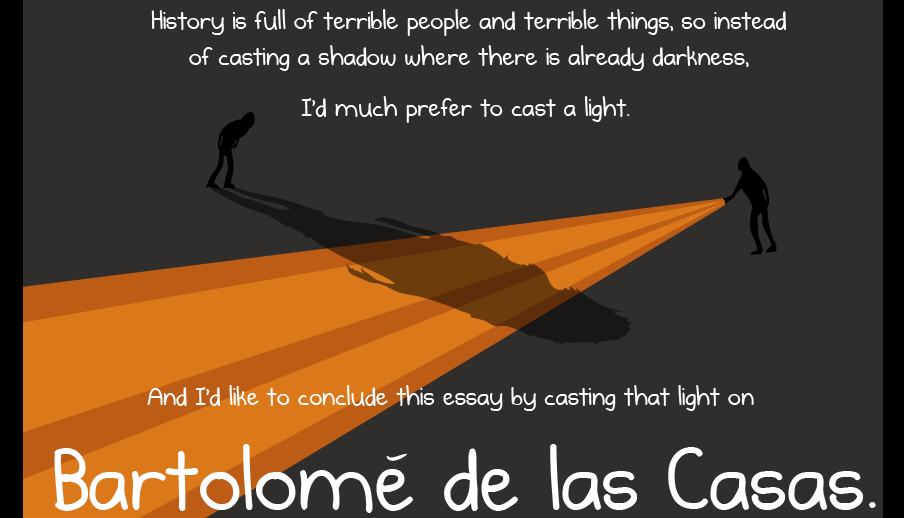When I was in high school, some well-meaning liberal fellow students went around tearing down flyers for Columbus Day as a protest. (Why were there flyers in the first place? I can’t remember.) I viewed this effort with disdain. One of the more prominent of the students had tried to seriously argue that heroin (the drug) was sexist because it was hijacking the word heroine (a female hero). It was awkward to watch our English teacher explain that the words aren’t even spelled the same.
That pretty much set my overall approach to complaints about atrocities from the colonial era. It’s not that I disagree that they exist. Far from it. My annoyance is that the complaints come from a place of lazy complacence. In the first place, none of the people I’ve heard maligning Columbus and other explorers for exploiting the Americas has seriously suggested giving the land back or in any way inconveniencing themselves to make amends whatsoever. In the second place, the complainers demonstrate such a total lack of moral sophistication that I cannot believe their concern is in any sense earnest. For example, they can’t seem to tell the difference between unintended tragedy (most of the fatalities from the introduction of new diseases) and intentional evil (like the Trail of Tears). The numbers are bigger for disease deaths, so that gets a lot of play, when in reality that’s a pretty poor example of human evil. In other words: attacking Columbus (or other colonialists and explorers) comes across as nothing but cheap self-righteousness of people best described as “harmlessly impotent” rather than “ethical”. So, when I saw The Oatmeal was tackling Columbus Day, my suspicions were high.
I was wrong.
The comic starts out predictably enough (the same frustrating conflation of genuine atrocity and inevitable epidemiology), but towards the end takes an incredibly surprising turn that completely won me over. As Matthew Inman writes, “History is full of terrible people and terrible things, so instead of casting a shadow where there is already darkness, I’d much prefer to cast a light.”
And then he does. And it’s incredible. Read the whole thing to find out more about that light.

It looks like the Knights of Columbus/Catholics should have chosen Bartolome de las Casas as their hero instead of Columbus. This is outside the point, but I had to dig a little on this statement: “Columbus Day was established in the 1930’s by a male-only Catholic organization known as the Knights of Columbus. They wanted a male Catholic role model their kids could look up to, so they pressured Roosevelt into making it a federal holiday.”
(Not a lot of time these days with a newborn, so I am cutting and pasting here instead of paraphrasing.) Just a little bit of google research on Wiki: “Catholic immigration in the mid-19th century induced discrimination from anti-immigrant activists. Like many other immigrant communities, Catholics developed organizations to fight discrimination and provide insurance for the struggling immigrants. The predominantly-Irish immigrants who organized themselves as the Knights of Columbus, chose that name in part because it saw Christopher Columbus as a fitting symbol of Catholic immigrants’ right to citizenship: one of their own, a fellow Catholic, had “discovered” America.[1][3]
Many Italian-Americans observe Columbus Day as a celebration of their heritage, the first occasion being in New York City on October 12, 1866.[4] Columbus Day was first enshrined as a legal holiday in the United States through the lobbying of Angelo Noce, a first generation Italian, in Denver. The first statewide Columbus Day holiday was proclaimed by Colorado governor Jesse F. McDonald in 1905, and it was made a statutory holiday in 1907.[5] In April 1934, as a result of lobbying by the Knights of Columbus, Congress and President Franklin Delano Roosevelt made October 12 a federal holiday under the name Columbus Day.”
Maybe The Oatmeal put their (technically correct, but incomplete) spin on it intentionally to prove their point on darkness. I just thought there might be a teeny bit more to it than that. Bartolome clearly should have won out on the Catholic role model award, though.
Yeah, his take on the Knights of Columbus was really, really slanted. This is a group that donates hundreds of millions of dollars every year and millions of hours of service on top of that. I think it’s pretty clear that he started out with the really obnoxious, politically-slanted criticism, but I’m just glad he managed to aim higher at the end.